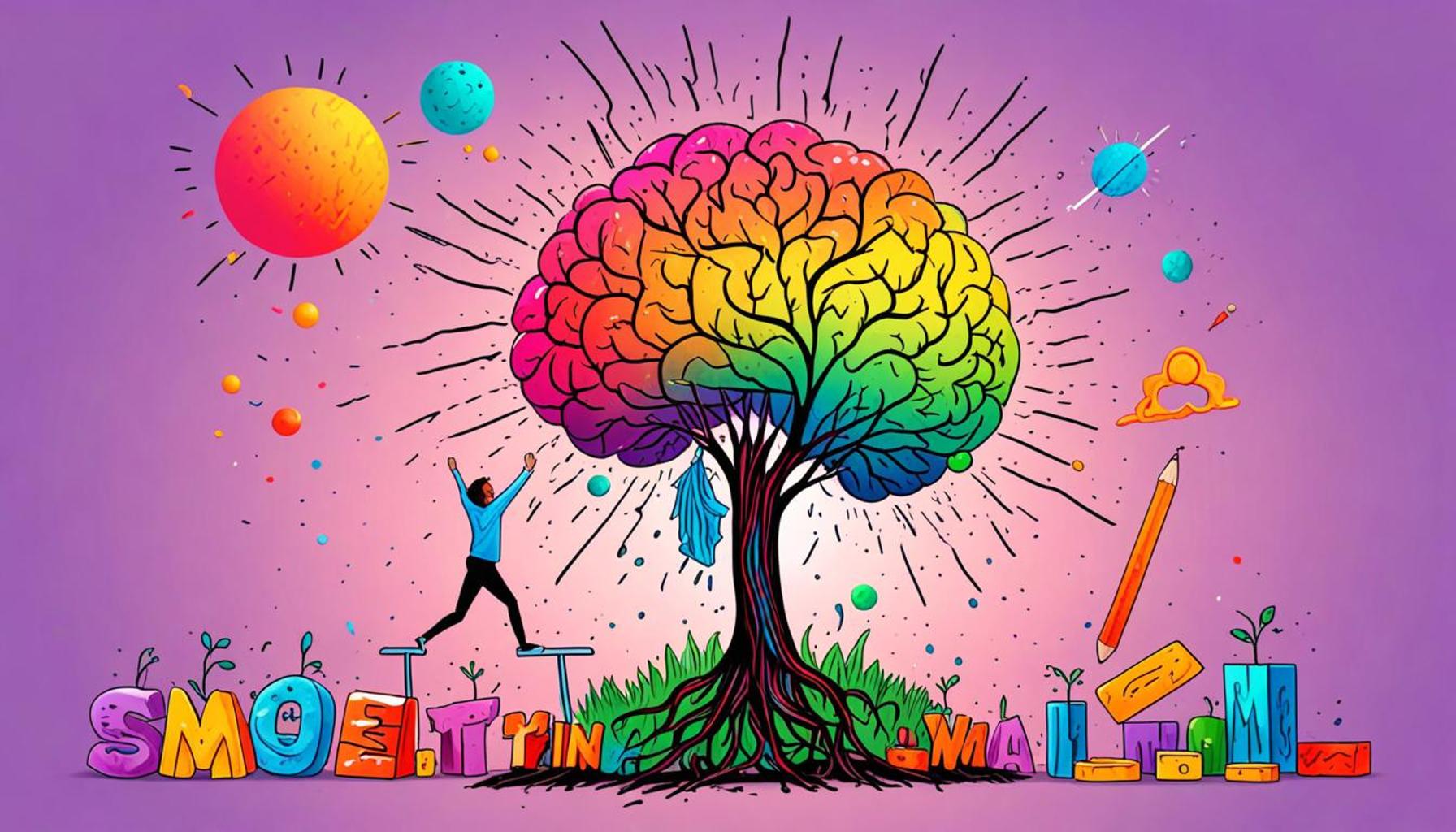Transforming Obstacles into Opportunities: Strategies for Embracing Challenges in Personal and Professional Life

Embracing Resilience Through Challenges
In the face of adversity, the spirit of innovation often flourishes, especially in a country as vibrant and diverse as Nigeria. The daily challenges that Nigerians encounter—ranging from economic fluctuations to infrastructural hurdles—serve as a unique backdrop where resilience and creativity intersect. By examining our responses to challenges, we can uncover pathways to personal and communal growth that not only benefit individuals but also the wider society.
A crucial aspect of navigating challenges is the Mindset Shift. This shift can be transformative, allowing individuals to reframe setbacks as stepping stones rather than stumbling blocks. For instance, a young entrepreneur in Lagos facing difficulties in sourcing raw materials might consider pivoting to local alternatives or even innovating a new product line. Learning from such situations fosters a culture of resilience, where mistakes become invaluable lessons and setbacks prompt creative problem-solving.
Another promising strategy is Networking. In Nigeria, collaboration can unlock new avenues for growth and insight. Joining professional organizations or local business forums can provide entrepreneurs with fresh perspectives and access to resources that may not have been available previously. For example, during the COVID-19 pandemic, many businesses turned to digital platforms, creating alliances to share information, resources, and technology that helped them weather the crisis. This solidarity illustrates how working together can amplify success against a backdrop of challenges.
Moreover, embracing Adaptability in our ventures is essential in today’s rapidly changing environment. In Nigeria, where market demands shift quickly, staying attuned to changes can define success. Small business owners might find that adjusting their operational strategies to incorporate e-commerce not only mitigates disruptions but also opens up new markets. Those who are flexible and willing to embrace change are often the ones who thrive in dynamic conditions.
Ultimately, facing difficulties is not just a simple fact of life but an opportunity waiting to be seized. As we reflect on our individual experiences with adversities, let us consider how we can harness the power of adaptability, collaboration, and a positive mindset to not only overcome challenges but also to leverage them into platforms for growth. In Nigeria, where the environment is rife with challenges, our ability to innovate and adapt will determine the landscape of our futures.

This exploration into effective strategies to navigate challenges serves as an invitation to reassess how we view obstacles. By embracing them, we may discover that the potential for success is often concealed within the very challenges we encounter daily.
SEE ALSO: Click here to read another article
Transformative Power of a Growth Mindset
In any journey toward success, whether personal or professional, cultivating a growth mindset is a critical strategy for transforming obstacles into opportunities. This concept, rooted in the belief that abilities and intelligence can be developed through dedication and hard work, is especially relevant in the context of Nigeria’s fast-evolving landscape. For instance, a traditional farmer in the North, accustomed to age-old practices, can embrace modern agricultural techniques and digital marketplaces to enhance productivity and access broader markets. By shifting perspective and viewing challenges as avenues for growth, individuals can unlock their potential and make significant strides toward their goals.
A key trait of those who adopt a growth mindset is their ability to practice self-reflection. Regularly assessing one’s strengths and weaknesses allows individuals to identify areas for improvement and take actionable steps toward overcoming challenges. For example, entrepreneurs may face numerous setbacks when launching a new product. Yet, those who make time to reflect on customer feedback, analyze market trends, and adapt their strategies are more likely to turn initial failures into successful ventures. This habit of introspection fosters not only personal development but also a culture of continuous learning within organizations.
Moreover, another powerful strategy is the identification and utilization of available resources. In Nigeria, countless resources remain untapped simply because individuals and organizations are often unaware of their existence or do not know how to leverage them. The country boasts a rich ecosystem of support organizations, funding opportunities, and mentorship programs tailored specifically for various sectors. By actively seeking out and engaging with these resources, professionals can navigate challenges more effectively. Here are some valuable options:
- Government Grants and Initiatives: Various federal and state programs provide funding and support for entrepreneurs.
- Non-Governmental Organizations: Many NGOs focus on boosting local businesses and offer skill development workshops.
- Networking Platforms: Online forums and local meetups can connect individuals with like-minded peers and potential collaborators.
- Technical Assistance: Workshops and training sessions on technology adoption can empower businesses to innovate.
Furthermore, embracing mentorship has proven to be a game-changer for many. Connecting with experienced professionals can provide invaluable guidance and support when faced with daunting challenges. For instance, young tech entrepreneurs in cities like Abuja can significantly benefit from the insights of seasoned industry leaders who have traversed the paths they wish to take. By sharing experiences—both successes and failures—mentors can help their mentees navigate through hurdles and capitalize on opportunities that arise along the way.
Incorporating these strategies not only equips individuals to confront challenges head-on but also fosters a proactive approach to embracing change. As we delve deeper into the myriad ways of transforming obstacles into opportunities, it becomes evident that with the right mindset, tools, and support, anyone can turn trials into stepping stones toward success.
| Category | Advantages |
|---|---|
| Resilience Building | Enhances adaptability to changing circumstances. |
| Skill Development | Fosters personal growth by learning new skills to overcome hurdles. |
As we delve into the concept of “Transforming Obstacles into Opportunities,” it becomes evident that one of the key strategies is building resilience. This enables individuals to not only cope with challenges but to thrive despite them. Mastering resilience leads to enhanced adaptability and fortifies one’s ability to handle setbacks, making it a crucial skill in both personal and professional spheres.Another important approach is skill development, which not only addresses immediate challenges but also prepares individuals for future hurdles. Embracing challenges prompts individuals to learn and grow, leading to the acquisition of invaluable skills that foster personal growth. By continuously evolving through their experiences, people can convert every obstacle into a stepping stone toward success.
ADDITIONAL INSIGHTS: Expand your understanding here
Leveraging Technology to Overcome Challenges
In today’s digital age, leveraging technology can be a transformative strategy for overcoming obstacles in both personal and professional realms. As Nigeria continues to embrace digital innovation, individuals and businesses have unprecedented opportunities to harness technology as a tool for growth. For example, small business owners can utilize e-commerce platforms to reach wider audiences, optimizing their marketing strategies through social media. This not only opens up new revenue streams but also helps create brand loyalty among customers who appreciate convenience and accessibility.
Moreover, the advent of mobile banking and payment solutions has revolutionized how Nigerians manage their finances, particularly in rural areas where traditional banking infrastructure remains limited. Services like Paystack or Flutterwave allow entrepreneurs to engage in financial transactions more efficiently, connecting them to a broader marketplace. By embracing these technological advancements, individuals can navigate financial hurdles that once seemed insurmountable.
Another opportunity lies in the realm of online education and skill development. Platforms such as Coursera, Udemy, and local initiatives like Funmi Eko Center provide access to a wealth of knowledge and training programs. Users can develop new skills or strengthen existing ones, equipping themselves to face the challenges of an ever-evolving job market. With the high unemployment rate in Nigeria, investing time in online learning can yield immense results, positioning individuals as competitive candidates in a crowded field.
Building Resilience through Community Support
Beyond technology, the importance of community support cannot be overstated. Building a robust network of connections, particularly in challenging times, can significantly impact one’s ability to overcome difficulties. For example, local entrepreneur hubs like the Co-Creation Hub in Lagos act as vibrant ecosystems where innovators and startups can find mentorship, funding, and collaboration opportunities. By immersing themselves in supportive communities, individuals can find reassurance and inspiration from others who share similar challenges.
Additionally, engaging in community outreach and giving back can foster a sense of purpose amid personal and professional struggles. Initiatives like Teach For Nigeria invite young professionals to contribute to education while developing leadership skills. Such involvement not only benefits the community but also enhances personal growth and creates a valuable network of like-minded individuals.
Emotional Intelligence: A Key Player in Navigating Adversity
Another layer of transformation involves developing emotional intelligence (EQ). This crucial skill allows individuals to manage their emotions effectively and empathize with others. In high-pressure scenarios—be it negotiating business deals or managing conflict within teams—emotional intelligence acts as a guiding compass. For instance, leaders who demonstrate empathy toward their employees can cultivate a culture of trust and collaboration, encouraging their teams to overcome challenges collectively. By developing a deeper understanding of oneself and others, individuals can navigate complex social dynamics, turning potential obstacles into opportunities for unity and growth.
As the discussion on transforming obstacles into opportunities continues, embracing technology, fostering community connections, and honing emotional intelligence stand out as pivotal strategies. With a conscious effort to implement these methods, individuals in Nigeria can position themselves not just as survivors of challenges, but as thriving architects of their futures.
ADDITIONAL INSIGHTS: Expand your understanding here
Conclusion: Embracing Change for Growth
In conclusion, the journey of transforming obstacles into opportunities is an essential paradigm that can significantly influence individual growth within the complex landscapes of personal and professional life. By actively embracing technology, individuals can unlock new avenues for success, from innovative business models to enhanced educational resources that build competitive skills.
Furthermore, the power of community support cannot be overlooked. Surrounding oneself with encouraging networks fosters resilience, allowing individuals to draw upon shared experiences and collective wisdom. As demonstrated by initiatives like Co-Creation Hub and Teach For Nigeria, collaboration is not just a strategy; it’s a catalyst for change that can elevate both individuals and communities.
Moreover, enhancing emotional intelligence equips individuals with the tools necessary to navigate adversity effectively. By understanding and regulating emotions, people can foster stronger relationships and create environments conducive to overcoming challenges. This skill is particularly crucial in today’s rapidly changing world, where adaptability is key to thriving.
Ultimately, it is clear that adopting these transformative strategies empowers individuals to reframe their challenges as stepping stones rather than stumbling blocks. The potential for growth is immense, and as more Nigerians implement these approaches, they pave the way for a brighter, more resilient future. Each challenge embraced is an opportunity realized, and together, we can turn our collective adversities into a mosaic of success.


